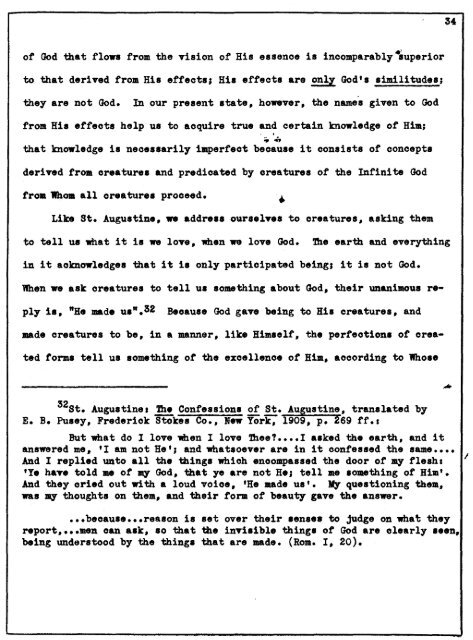Natural Knowledge of God in the Philosophy of Saint Thomas Aquina
You also want an ePaper? Increase the reach of your titles
YUMPU automatically turns print PDFs into web optimized ePapers that Google loves.
34<br />
4'<br />
<strong>of</strong> <strong>God</strong> that flows from <strong>the</strong> vision <strong>of</strong> His essenoe is <strong>in</strong>oomparably superior<br />
to that derived from His effectsl His effeots are only <strong>God</strong>'s similitudes;<br />
<strong>the</strong>y are not <strong>God</strong>.<br />
In our present state, however, <strong>the</strong> names given to <strong>God</strong><br />
from His effeot. help us to aoquire true and certa<strong>in</strong> knowl.dge <strong>of</strong> Him;<br />
, .<br />
.. 0 • .,<br />
that knowl.dge il necessarily imperfeot because it consists <strong>of</strong> concepts<br />
deriv.d from oreaturel and predioated by cre.tur.s <strong>of</strong> <strong>the</strong> Inf<strong>in</strong>ite <strong>God</strong><br />
from Who •• 11 creatures proceed.<br />
Like St. August<strong>in</strong>., we addr.ss our.elves to cre.ture., ask<strong>in</strong>g <strong>the</strong>m<br />
to tell us what it is 1N lcve, when we love <strong>God</strong>.<br />
i!1e .arth and everyth<strong>in</strong>g<br />
<strong>in</strong> it acknowl.dges that it is only p.rtioipated be<strong>in</strong>g; it is not <strong>God</strong>.<br />
When .... ask creatures to tell us someth<strong>in</strong>g about <strong>God</strong>, <strong>the</strong>ir unanimous reply<br />
is, "H. made u.".32 Becaus. <strong>God</strong> gave be<strong>in</strong>g to His cre.tures, and<br />
made ore.tures to b., <strong>in</strong> a manner, like Himself, <strong>the</strong> perfections <strong>of</strong> created<br />
forms t.ll us som.th<strong>in</strong>g ot <strong>the</strong> exc.ll.nc. cf Him, acoord<strong>in</strong>g to Whcse<br />
32St• Augu.t<strong>in</strong> •• fbe Conf.ssions <strong>of</strong> St. August<strong>in</strong>., translat.d by<br />
E. B. Pus.y, Fred.riok stOk.s Co., N.w YOrk, 1909, p. 269 tt.r<br />
But what do I love wh.n I love Th.e? ••• I a.k.d <strong>the</strong> e.rth, and it<br />
.nswered m., 'I am not H.'; .nd whatsoever .re <strong>in</strong> it oonfessed <strong>the</strong> same ••••<br />
And I replied unto all <strong>the</strong> th<strong>in</strong>gs whioh encompassed <strong>the</strong> door <strong>of</strong> my flesha<br />
'Ye have told me <strong>of</strong> ~ <strong>God</strong>, that ye are not He; t.ll me .ometh<strong>in</strong>g <strong>of</strong> Him'.<br />
And <strong>the</strong>y oried out with a loud voic., 'He mad. us'. My question<strong>in</strong>g th.m,<br />
was my thoughts on th.m, and <strong>the</strong>ir form <strong>of</strong> b •• uty gave <strong>the</strong> answer •<br />
I<br />
••• beoaus •••• re.son is s.t over <strong>the</strong>ir •• nsee to judge on what th.y<br />
report, ••• men can a.k, so that <strong>the</strong> <strong>in</strong>visible th<strong>in</strong>gs ct <strong>God</strong> are olearly ••• n,<br />
be<strong>in</strong>g understood by <strong>the</strong> th<strong>in</strong>g. th.t ar. made. (Rom. I, 20).


















